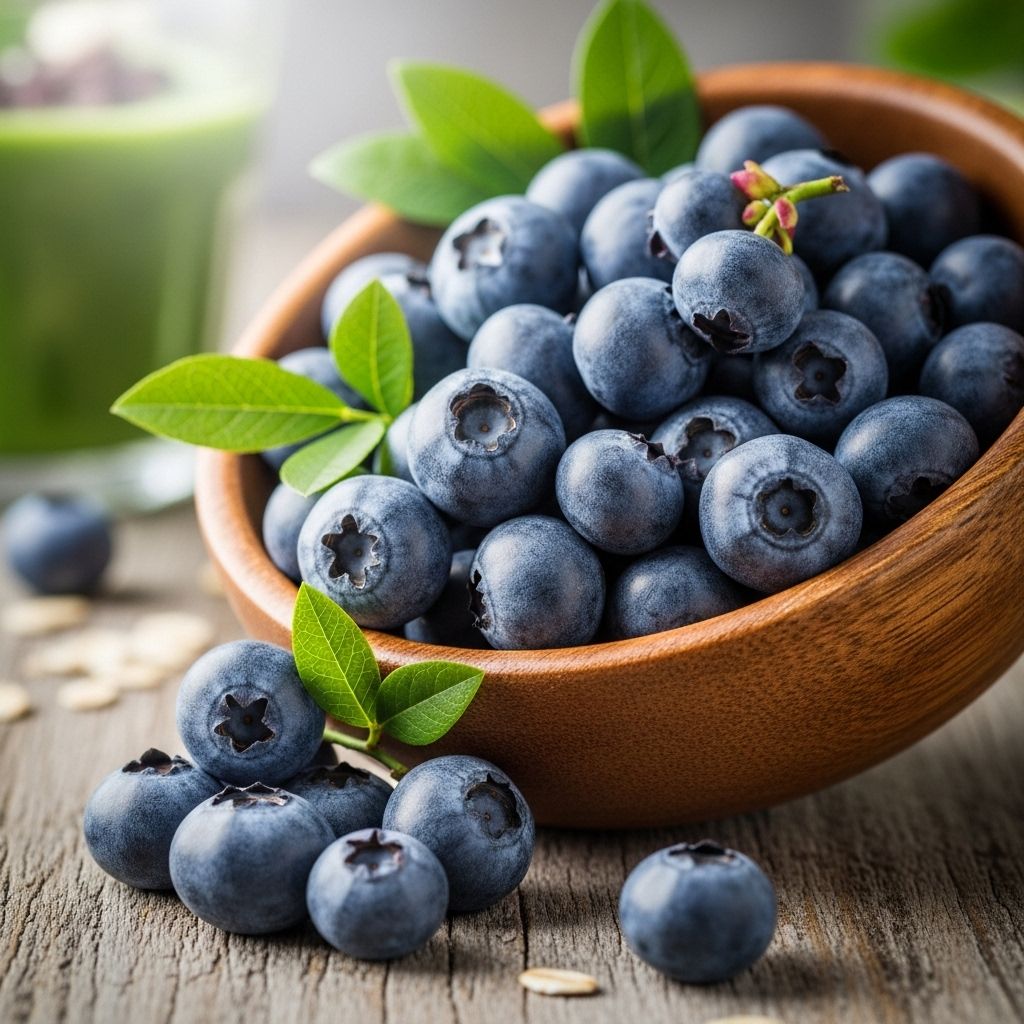12 Impressive Health Benefits of Blueberries Backed by Research
Antioxidant-rich boost for circulation, sharper focus, and a radiant complexion.

Blueberries are more than just a tasty fruit—they are among the most nutrient-dense foods on earth. Scientists and nutritionists praise their ability to support heart health, improve cognitive function, and provide numerous other benefits. This article explores the top science-backed advantages of blueberries, their nutritional profile, practical tips for consumption, possible side effects, and commonly asked questions.
Nutritional Profile of Blueberries
Blueberries are low in calories yet high in essential nutrients. In just one cup (about 148 grams), blueberries provide:
- Calories: 85
- Fiber: 3.6 grams (13% Daily Value)
- Potassium: 116 mg (3% DV)
- Vitamin K: 29 micrograms (24% DV)
- Vitamin C: 14 mg (16% DV)
- Folate: 9 micrograms (2% DV)
- Carbohydrates: 21.7 grams
They also contain small but significant amounts of vitamins A, E, and several phytonutrients, which act as potent antioxidants.
Top Health Benefits of Blueberries
1. Antioxidant Powerhouse
Blueberries rank among the highest of all commonly consumed fruits and vegetables in antioxidant capacity, particularly thanks to their anthocyanins—compounds giving blueberries their deep color. Antioxidants neutralize free radicals, which damage cells and speed up aging.
- Help reduce oxidative stress and inflammation.
- Delay signs of aging and support longevity.
2. Supports Heart Health
Regular consumption of blueberries is linked to a reduction in risk factors associated with heart disease.
- May lower LDL (“bad”) cholesterol.
- Helps reduce blood pressure, partially by boosting nitric oxide for better blood vessel relaxation.
| Health Marker | Impact |
|---|---|
| LDL cholesterol | Decreases by 0.21 mmol/L (meta-analysis) |
| Systolic blood pressure | Reduces by ~2.7 mmHg |
3. Improves Brain Function
Blueberries support cognitive health, particularly in older adults. Studies show that regular blueberry intake can enhance memory, focus, and moods.
- May help slow age-related cognitive decline.
- Could improve memory and learning in older adults.
4. Aids in Blood Sugar Control
With a relatively low glycemic index and high fiber, blueberries help regulate blood sugar. They may:
- Improve insulin sensitivity, especially in insulin-resistant individuals and those with type 2 diabetes.
- Blunt post-meal blood sugar spikes.
5. Promotes Digestive Health
The fiber in blueberries feeds beneficial gut bacteria and supports regularity. Eating blueberries may:
- Reduce constipation.
- Support a healthy gut microbiome.
6. Boosts Immune System
Blueberries contain vitamins C and K as well as phytonutrients which help strengthen immunity.
- May help fight infections and support immune response.
- Neutralize harmful pathogens by reducing oxidative stress.
7. Protects Against Cancer
Antioxidants in blueberries may defend against various types of cancer by protecting DNA from damage and slowing the growth of cancer cells.
- Anthocyanins and polyphenols suppress cancer cell proliferation.
- Enhance DNA repair mechanisms.
8. Supports Eye Health
Compounds in blueberries like vitamins C, E, and A may help safeguard vision.
- Anthocyanins protect retinal cells from oxidative stress.
- May delay age-related macular degeneration.
9. Enhances Skin Health
Vitamin C in blueberries promotes collagen production, which helps skin stay firm and youthful.
- Reduces skin damage from sun and pollution.
- May help prevent wrinkles and skin aging.
10. Aids Weight Management
Blueberries are low in calories and high in fiber, which helps increase satiety.
- Beneficial for weight loss or maintenance plans.
- Promote healthy metabolism and digestive regularity.
11. Promotes Healthy Bones
Vitamin K and manganese in blueberries support bone health and repair.
- May help decrease risk for osteoporosis.
- Support bone mineral density.
12. Supports Urinary Tract Health
Blueberries, like cranberries, can help protect against urinary tract infections.
- Anti-adhesive compounds may prevent bacteria from sticking to urinary tract walls.
- Anthocyanins contribute to this protective effect.
Best Ways to Consume Blueberries
Enjoy blueberries:
- Fresh and raw—maximizes nutrient and antioxidant retention.
- Frozen—preserves most nutrients and can be stored year-round.
- Added to smoothies, oatmeal, yogurt, salads, or healthy desserts.
- Note: Baking or cooking may reduce antioxidant content but preserves fiber and most minerals.
Potential Side Effects and Precautions
Blueberries are safe for most people, but consider:
- High intake of blueberries may interact with certain blood-thinning medications due to the vitamin K content.
- Those with allergies to berries should avoid consumption.
- Blueberry allergy is rare but possible; watch for symptoms after eating.
Eating blueberries in moderation is recommended for people managing carbohydrate intake, such as those with diabetes.
Frequently Asked Questions (FAQs)
Q: How many blueberries should I eat per day?
Most studies suggest that a serving of 1 cup per day provides measurable health benefits. However, even smaller amounts regularly consumed can have positive effects.
Q: Should I choose organic or conventional blueberries?
Organic blueberries may contain fewer pesticide residues. Both organic and conventional offer similar health benefits as long as they are fresh and properly washed.
Q: Are frozen blueberries as healthy as fresh?
Frozen blueberries retain most of their nutrients and antioxidants. They are a convenient, cost-effective choice, especially outside of the growing season.
Q: Can blueberries help with diabetes?
Research indicates that blueberries can improve insulin sensitivity and help regulate blood sugar. People with diabetes should pay attention to portion size to stay within their carbohydrate goals.
Q: Is it safe to eat blueberries daily?
Absolutely. There are no known risks for healthy individuals. They can be enjoyed regularly for optimal benefits.
Key Takeaways
- Blueberries are a rich source of vitamins, minerals, antioxidants, and fiber.
- They support heart, brain, digestive, skin, and bone health, while aiding weight management and defending against disease.
- Fresh, raw blueberries are most potent for health benefits.
- Moderation is key, especially for those with specific health conditions.
References
- Business Insider – 7 Health Benefits of Blueberries, Backed by Science
- Cleveland Clinic – 5 Health Benefits of Blueberries
- PMC – Dietary Berries, Insulin Resistance and Type 2 Diabetes
References
Read full bio of medha deb








